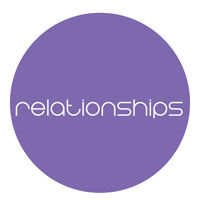

Bettering Your Relationships
Improving Romantic Relationships
Expanding Your Social Circle
Connecting with Trusted Adults
Communicating Respect
If you want something, you have to ask. If you need something, you have to say so. If something is bothering you, you’re more likely to get a change in someone else’s behavior if you talk about it directly. Other people can’t read your mind, no matter how much you wish they could!
The Basics
Start With “I” Statements
“I” statements focus on your feelings and how the other person’s behavior is affecting you, rather than simply blaming the other person. Here is the basic format for “I” statements:
I feel _________ when you ____________ because ___________.
When you ____________, I feel ____________ because ___________.
By starting with the word “I” you are putting the focus on you—what you feel and why. This gives the other person the opportunity to understanding you and opens the door to a conversation rather than a fight.
“I” Statements (Examples and Practice Scenarios)
This worksheet from Therapist Aid provides examples of “I” statements and offers a few practice scenarios.
Disagreeing With Respect
Excerpted from 5 Ways to (Respectfully) Disagree @TeensHealth.org
Many us either shy away completely from disagreements or lose it when things don't go our way. These 5 tips can help keep disagreements constructive — whether you're talking to a parent, friend, or anyone else:
- Don't make it personal.
- Avoid putting down the other person's ideas and beliefs
- Use "I" statements to communicate how you feel, what you think, and what you want or need.
- Listen to the other point of view.
- Stay calm.
Read more...
What is Assertive Communication?
Assertive communication means stating directly what you feel, need and want. It is using your words, rather than manipulative or aggressive behavior, to get what you need or want. Assertive communication is about owning who you are. It is essential to maintaining healthy boundaries and building self-respect.
- 5 Tips for Resolving Conflicts
This handout provides five tips for resolving conflicts in a relationship, including keeping the focus on the problem (not the person), listening and reflecting what you hear the other person saying, making “I” statements, taking timeouts, and working towards a compromise when it becomes clear you will not agree.
- Fair Fighting Rules
If you know you’re headed for fight, keep this cheat sheet for “fighting fair” handy.
Anger Management Toolkit
Feeling angry is a normal and healthy. Learning how to manage your anger and direct it in a productive way is a critical developmental task of being human. If you struggle with the healthy expression of anger, you may find these handouts and worksheets helpful. You may want to ask your social worker, therapist or another trusted adult to help you find healthy strategies for directing or redirecting anger that will work for you.
- Introduction to Anger Management
The first step in anger management is to begin learning about your own anger. This worksheet will help you identify triggers, how you react when you’re angry, and explore how anger has affected your life.
- Know Your Anger Warning Signs
How do you know when you’re getting angry? This worksheet is a simple list of common warning signs people experience. Some of these warning signs might start when you are only a little irritated, and others might start when you are very angry.
- Triggers and Choices - Let It Go or Act Assertively?
This is an Anger Decision Sheet to help you explore various situations that trigger your anger (an injustice, criticism, obstacles to doing what you want) and to consider the options you have to deal with it.
- Anger Management Skills
This handout covers fair fighting rules plus things you can do to calm down, including breathing and visualization techniques.